Are you struggling to turn leads into loyal, paying customers? In order to win sales, you have to nurture your leads throughout the customer journey. Each interaction counts, from the moment someone first visits your site to the point of making a purchase. If you overlook key steps in your lead nurturing process, you’ll miss valuable opportunities and see low conversion rates.
In this post, I’ll share the 6 most common lead nurturing mistakes that could be holding you back, and I’ll explain how to avoid them to maximize your campaign’s success.
Why You Need a Lead Nurturing Strategy
Imagine a business with an excellent product and competitive pricing, but very few customers. How is that possible?
Well, chances are, that business hasn’t been nurturing their leads.
But what exactly is lead nurturing? Lead nurturing is when you reach out to leads during every step of the sales journey. The goal is to establish and strengthen relationships with your visitors, so they’re more likely to become paying customers.
According to Adobe, “Companies that excel at lead nurturing generate 50% more sales-ready leads at 33% lower cost.” They also found that nurtured leads make 47% larger purchases.
When done right, lead nurturing can help you generate more leads and convert prospects into customers. More customers mean a huge increase in revenue.
This sample customer journey map of the phases of the nurturing process:
As you can see, leads don’t turn into customers instantly. You have to warm them up first, and systematically build a relationship with them before they will be ready to buy.
How do you achieve this? By creating an individualized journey for each lead who comes across your site.
That’s where OptinMonster comes in! You can use our popups, floating bars, and other onsite campaigns to target your best offers to the right visitors at just the right time in their customer journey.
6 Lead Nurturing Mistakes to Avoid
Mistake 1: Skipping the Research Phase
When it comes to generating leads and making sales, understanding your ideal prospect is everything.
And that takes quite a bit of research.
Most people would like to skip this phase of the process. But if you do, you’re setting yourself up for failure.
No matter what your product or service is, you can’t win customers unless you truly understand the target audience you’re selling to.
Here are a few ways to get started with your audience research:
- Conduct Surveys and Interviews: Gather direct feedback through surveys, interviews, or focus groups to understand customer needs, preferences, and challenges. You can even collect customer feedback directly on your website.
- Monitor Social Media Interactions: Observe conversations on social platforms to identify trending topics, common challenges, and feedback about your brand or industry.
- Use Google Analytics & Website Data: Look at metrics like page views, bounce rates, and time on page to see what content resonates most with your audience, offering clues about their interests.
Mistake 2: Not Optimizing Your Lead Magnet
Hopefully, you are already using a lead magnet to entice your prospects to give you their email addresses.

If not, you definitely want to start capturing email addresses as soon as possible. That way, you can create email marketing lists for your email nurturing campaign. Rocketbots.io used OptinMonster lead magnets to grow their email list by 680%!
But to reap these rewards, you need to ensure your magnet entices the reader and is located in a place visitors can see.
Here are a few key ways that you should be optimizing your lead magnets to get the most conversions as possible:
- Your main, catch-all lead magnet should solve a big problem that your buyer persona is facing.
- For blog post pages, use content upgrades as your lead magnet. These are lead magnets that you create specifically for an individual blog post, and they help the reader take the next step after reading.
- Your optin should be fully optimized for conversions. Use our 63-point checklist for creating the ultimate optin.
- Your optin should be placed on these 14 high-converting places on your website. Moreover, you should always include an exit popup and a scroll popup, in addition to embedding the form within your content.
- Make sure that the lead magnet itself is well-designed and valuable so that your prospect will be really impressed when they download it.
- Split test your lead magnets to see which offers resonate the best.
Mistake 3: Failing to Implement a Lead Nurturing Email Campaign
Some marketers have no problem capturing leads, but they still struggle to make sales. This problem is most commonly caused by a lack of an effective lead nurturing campaign.
Imagine yourself in the shoes of your prospect. They visited your website, they liked what they saw, and they loved your lead magnet. Now what?
Don’t drop your download and then leave your leads in the cold. First, every new subscriber should receive an email welcome series that introduces them to your brand and nurtures them through your sales funnel. Your nurturing campaign will continue beyond that welcome series, however. Here are some steps to take to plan your lead-nurturing emails:
Step 1. Choose a goal for your lead nurturing campaign.
What is the end action that you want your prospects to take? What products do you want them to purchase, and in what order?
This sounds simple, but defining your goals will help you to reverse engineer the journey that your prospect will take to become a paying customer.
Step 2. Segment your list.
Your lead nurturing campaign should look a bit different for each lead, depending on how they got on your email list in the first place and what their particular interests/needs are. To segment your list, break it down into smaller groups based on specific criteria, such as:
- Demographics
- Buyer personas
- Interests
- Stages in the sales cycle, etc.
To learn all the different ways of segmenting your list, check out our other post on 50 Smart Ways to Segment Your Email List Like a Pro.
Step 3. Choose a robust email marketing software.
For your lead nurturing campaign to be effective, you’ll need the right tools to get the job done. That means using email marketing software that is robust enough to handle your segmentation and email automation needs.
Some good options include:
OptinMonster integrates with all popular email marketing platforms, so you any leads you collect on your site will go directly onto your email list. You can even use OptinMonster to automatically segment your leads.
Step 4. Map out your entire campaign.
Create an outline of the emails that you will send out to each segment of your list. These emails should include both value-driven and offer-driven emails. That way, you can build trust with your subscribers before going in for the sale.
Also, keep in mind that many prospects won’t buy the first time you ask. However, they may buy from you down the road, so don’t give up.
Step 5. Write your autoresponder sequence.
Now it’s time to write out your sequence. That’s a big topic in and of itself, and you can learn more in this post: Email Copywriting That Sells: 17 Simple Ways to Write Better Marketing Emails.
In general, write as though you’re conversing with one person instead of to your entire list. Additionally, you should use language that they can relate to on a personal level. In other words, steer clear of jargon and dry corporate speak.
Step 6. Monitor and improve your campaign.
As with any campaign, you’ll want to monitor, test, and improve your lead nurturing sequence. Use your email marketing analytics to discover where your subscribers are dropping off, and run A/B split tests to fine-tune each email.
You can also send surveys to your list at critical points throughout your sequence. These can help you troubleshoot why someone isn’t buying or discover if there’s another product they’d be more interested in.
Mistake 4: Ignoring the Follow-up
When one of your leads shows interest in your product, do you follow up with them?
Maybe they didn’t buy right away because they had to think about it. Are you reminding them that they need to make a decision?
For example, Baymard Institute estimates that 70% of online shopping carts are abandoned. That means people are adding items to their carts but leaving your site before they complete the purchase. However, you can follow up with those shoppers with a cart abandonment email to remind them about the products they were interested in:
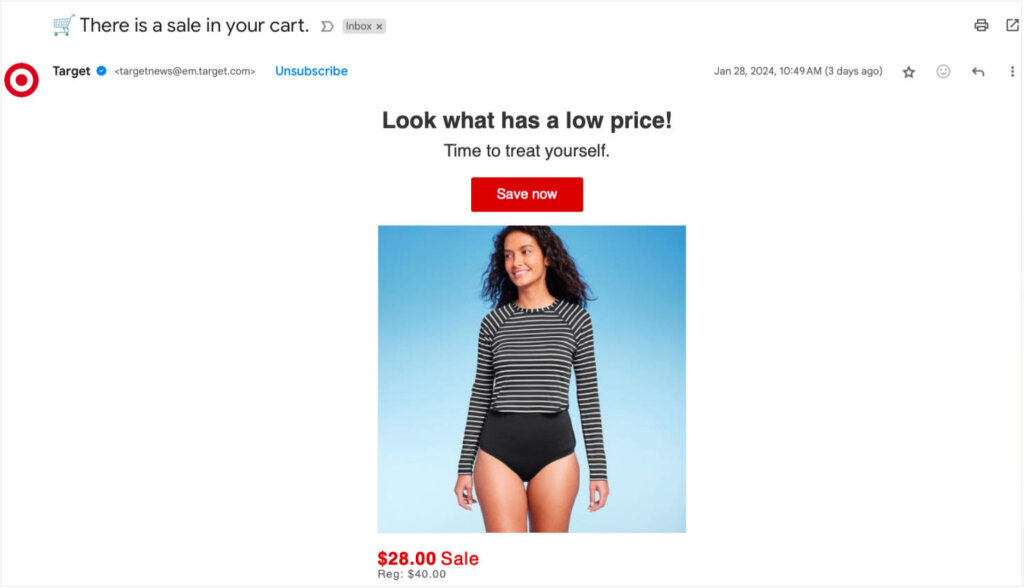
You can also use OptinMonster to nurture those shoppers before they leave your site in the first place. Our Exit-Intent® technology detects when users are trying to leave your site and lets you show them targeted campaigns.
For instance, you can place an exit-intent popup on products, checkout, or cart pages. Use your popup to convince those interested leads to complete their purchase.
Do OptinMonter’s Exit-Intent® popups work? Our customer Shockbyte doubled their sales and grew their business 10x by using exit popups like this one:
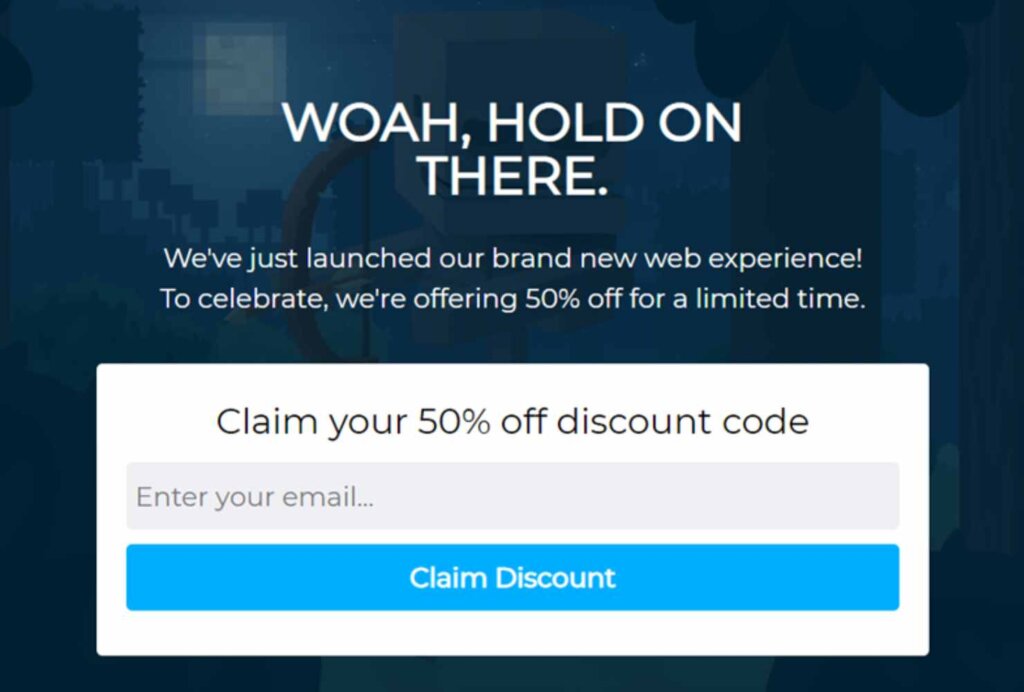
Follow Up With Every Lead With OptinMonster
With OptinMonster’s robust targeting rules, you’ll never miss an opportunity to convert a visitor. Learn how Anywhere.com recovers 56% of abandoning visitors with Onsite Follow Up Campaigns!
Mistake 5: Lack of an Effective Sales Pitch
None of your lead-nurturing efforts will matter if you don’t have an effective sales pitch. So, how do you create a good sales pitch?
It starts with developing an effective value proposition, which is a concise statement that explains what problem your product solves, what benefits it delivers, and what makes it different than the competition. Your value proposition will be the basis for any sales pitch you use on your site or marketing campaigns.
Check out this sales pitch from the project management platform, Basecamp.
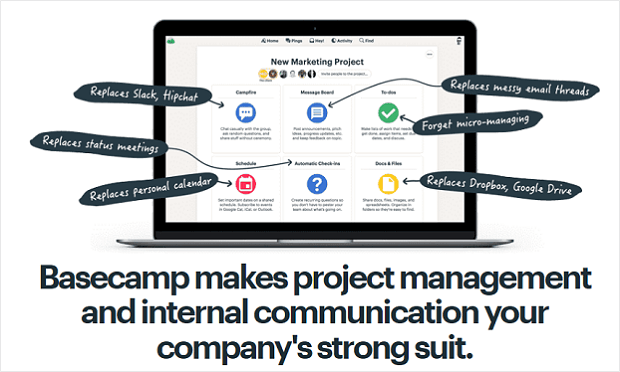
Want to know what makes this pitch great? It drives the point home with as few words as possible. One quick glance at the landing page and you already know what Basecamp does and how it beats the competition.
Mistake 6: Not Testing & Tweaking Your Campaigns
You’ve probably read about the importance of testing many times, so let’s get straight to the point: are you testing your campaigns?
If the answer is no, why haven’t you started?
Many small businesses avoid testing because it can seem overwhelming. However, our beginner’s guide to A/B testing has everything you need to get started.
OptinMonster makes A/B testing a breeze with our built-in split testing feature:
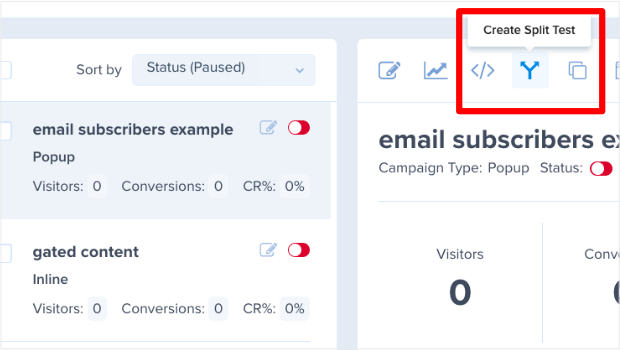
With the click of a button, you can assess the performance of your:
- Headlines
- Lead magnet
- Call-to-action button
- Layouts and styles
- Campaign triggers
- and more
When you run these types of tests, you can figure out what did and didn’t work in your campaign. Then, you can adjust your strategy to get the best results across your site.
Test Every Stage of Your Lead Nurturing Funnel
Check out our list of the 7 Best Conversion Rate Optimization Tools to help you win more leads and sales.
Grow Your Business Through Lead Nurturing
At the end of the day, your conversions are dependent on two things:
- How well you understand your prospect.
- How well you tailor the journey to them, starting the moment they find your site
Start by fixing Mistake 1, if you haven’t done so already. Understanding your customer is usually the toughest part. Once you’ve really done your research, it will be far easier to identify exactly how avoid the other 5 mistakes.
If you’re ready to nurture every lead who visits your site, sign up for OptinMonster today!
Related Resources:

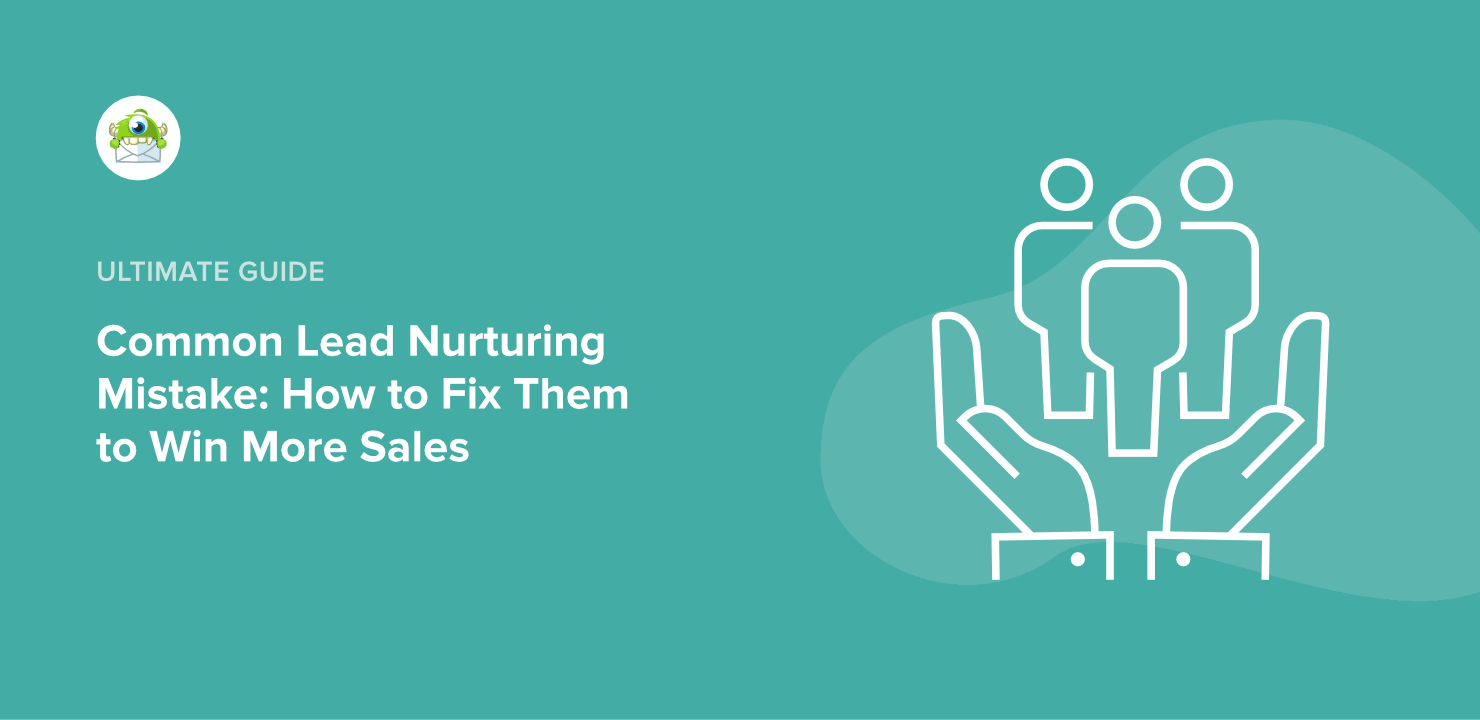
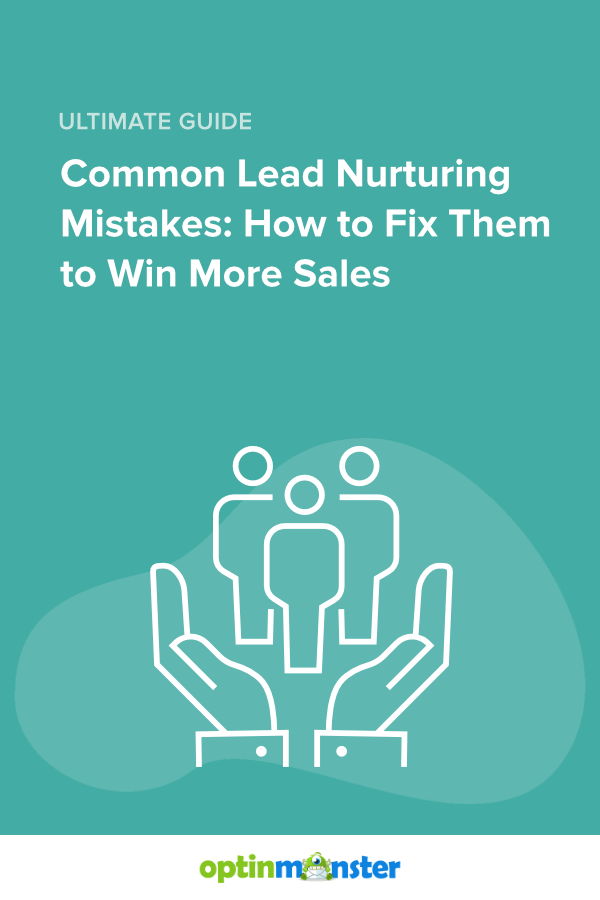


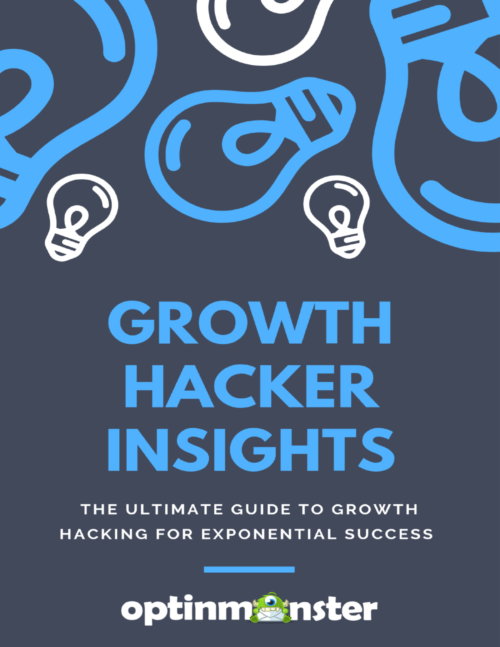
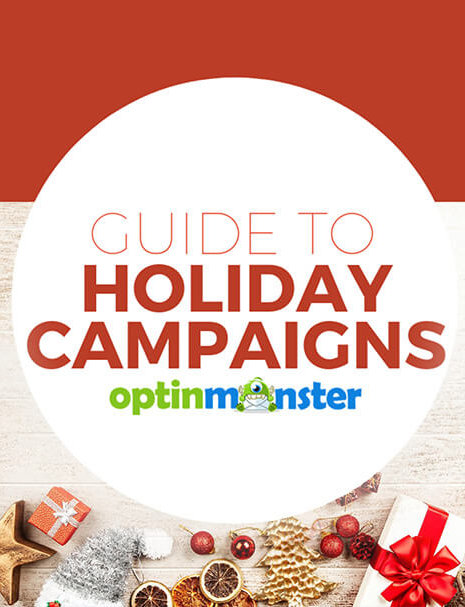
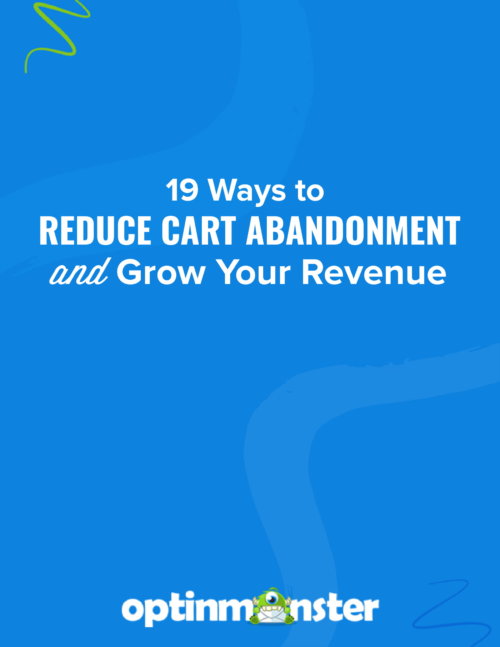



Add a Comment